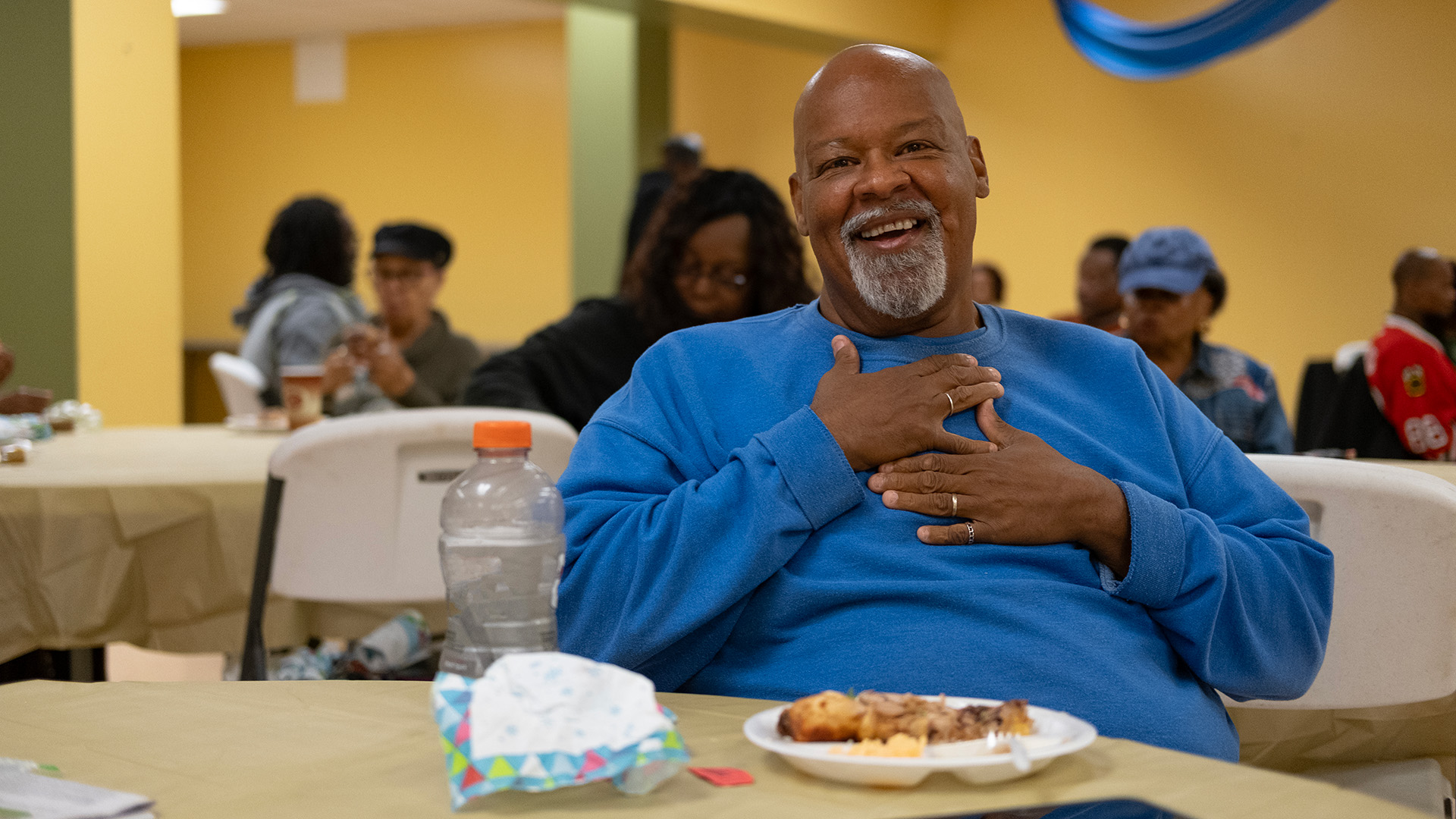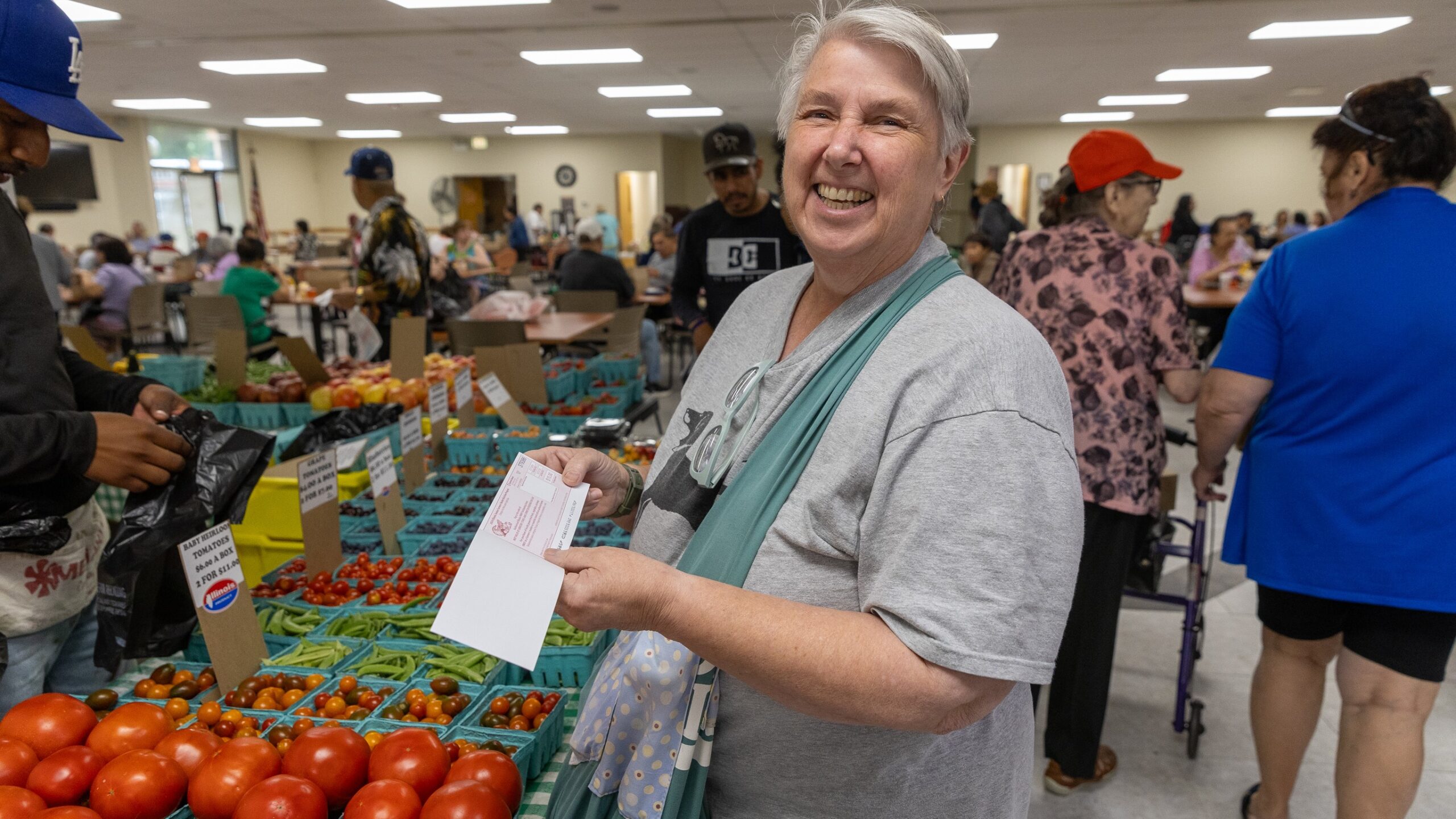
The Power of Prepared Meals
LaShell Shells, 53, has been visiting the food pantry at St. Moses the Black Parish in the Greater Grand Crossing neighborhood for more than 20 years. Earlier this year, he noticed the pantry was offering something new – prepared meals.
“They’re good!” he said emphatically. “My favorite is the turkey chili. I get some of these every time I come here.”
In recent years, the Food Depository began creating and distributing meals for neighbors experiencing food insecurity for whom access to healthy groceries is only part of the solution. Preparing food is an additional challenge for many neighbors, including older adults, people with disabilities, neighbors on medically tailored diets and more.
When the Food Depository completed our new prepared meals center, Chicago’s Community Kitchens, in early 2024, we greatly increased our capacity to provide these scratch-made, heat-and-eat meals. In addition to being tasty, the meals accommodate neighbors managing chronic health conditions such as diabetes and high blood pressure. These patients often must maintain strictly balanced diets that can be difficult to access with limited resources.
Currently our team produces 2,500 to 3,000 meals a day, which we distribute to older adults, people with disabilities and partner food pantries to make available to their guests. At full capacity, we will be able to produce 10,000 meals a day.
“[People] deserve access to good, healthy food, and for some of them, these meals are the only way they can get it.”
Pamela Butts, pantry coordinator at New Eclipse Community Alliance
The completion of Chicago’s Community Kitchens marked the conclusion of the Nourish Project, a multi-year initiative to transform our facility and programs to respond to our neighbors’ evolving need for food now and well into the future.
Six years after launching the project, thanks to generous donors who supported a capital campaign for the initiative, we look at our completed facility with inspiration and gratitude for the generous donors who made this vital expansion possible. We also look forward to the many ways these enhancements will further our work to end hunger throughout Chicago and Cook County.
Icylee Clark, 52, appreciates the prepared meals she receives at St. Moses the Black’s food pantry because they provide access to a well-rounded, fresh meal she normally doesn’t have. “I like them because I don’t have a stove, so I can’t cook,” she said. “But I can make these in the microwave, and they’re very good.”
“People deserve to eat with dignity,” said Pamela Butts, pantry coordinator at New Eclipse Community Alliance in Fuller Park. “They deserve access to good, healthy food, and for some of them, these meals are the only way they can get it.”
The Food Depository first launched the Nourish Project in 2017 to equip us to more efficiently respond to the growing and changing needs for food in Cook County since our founding in 1979. Early projects included the addition of cold storage to keep up with the demand for fresh produce, milk, protein and other healthy foods. We also created additional loading docks so more of our truck drivers could prepare deliveries at the same time. And we opened multiple repack spaces for volunteers to help prepare food for distribution and built a new volunteer orientation hall.
Thanks to the generosity of hundreds of supporters, we completed these early projects in 2019, months before the pandemic struck. The changes proved essential as we responded to the unprecedented demand for food throughout the COVID-19 health crisis.
We resumed the Nourish Project in 2022 to increase our capacity to provide nutritious prepared meals for people at elevated risk of hunger. A study from the National Institutes of Health found that access to nutritious, prepared meals enables individuals to lead healthier lives, which ultimately builds healthier communities. The need for prepared meals is expected to increase dramatically as the Baby Boomer generation ages. Many older adults live on fixed incomes and face mobility and health challenges that make it difficult to acquire and prepare food.
“Many of the people who select the meals are our seniors,” said Judy Maslo-Daugherty, pantry coordinator at St. Moses the Black Pantry. “A lot of older folks aren’t as mobile, making it harder to cook for themselves.”
Food Depository Executive Chef Michael Goss said his team has been excited to ramp up meal production to serve even more neighbors. “Everything we do is based on the premise that everybody deserves a quality, wholesome meal,” he said.
In addition to preparing meals in-house, the Food Depository contracts with small, community-based businesses to purchase meals to distribute to other priority populations, including young people who are not in school or employed and asylum-seeking new arrivals. The purchases serve as a catalyst to address the root causes of hunger by creating economic impact in historically disinvested communities and access to a living wage.
While Chicago’s Community Kitchens and the Nourish Project construction are complete, the work continues. Food insecurity throughout Chicago and Cook County remains elevated, with demand for food reaching similar levels seen during the pandemic. The generosity of our supporters remains crucial in our mission to end hunger.




